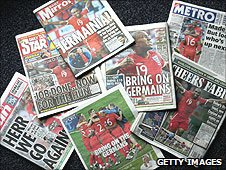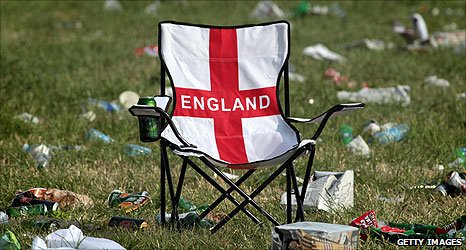|
England has exited the football World Cup and once again failed
to live up to expectations. But why do the English fool themselves,
again and again, into believing they can win, and might they actually
enjoy it?
According to Wikipedia, hysteria is "a state
of mind of unmanageable fear or emotional excesses. The fear is often
caused by multiple events in one's past that involved some sort of
severe conflict."
Sound familiar?
After a humiliating 4-1 defeat to Germany,
England has once again entered an unofficial period of national
mourning. It's something the country goes through after every World Cup
or European Championship exit - from euphoric anticipation to shock and
despair in the space of 90 minutes.
|
It's a communal moment, people sharing the
pain with each other at the bus stop. It's that thing about
big World Cup games that end in tragedy
Simon Kuper |
So have the English become hysterical in
their dealings with the national side?
Harry Eyres, writer of the Financial Times's
Slow Lane column, believes the passion has taken on a desperate,
obsessive quality: "Too much seems to hang on it. We appear needy as a
nation. There's an extraordinarily neurotic fear and excessive
expectation about watching England. I don't think we're in touch with
reality."
The world is entranced by the beautiful game
every four years. But not everyone seems to invest as much importance in
their national side.
On holiday in Spain during the 2002 World
Cup, Eyres remembers pulling into a bar in Andalucia to catch the end of
the Spanish team's quarter final with South Korea.
The talented Spanish side went on to lose but
there was no vitriol, Eyres recalls: "It was amazing how lightly they
took it. This was a working class, blue collar bar. Can you imagine a
pub full of builders in England when the team get knocked out - it would
be a tragedy. My impression is that in Spain it just doesn't matter so
much."
|
BLAME A COLONIAL PAST? |
|
Some believe the English feel entitled to win
the World Cup - which derives from the entitlement of
Empire.
But historian Linda Colley, who
specialises on empire and nationalism, says too much is
attributed to loss of the colonies.
"Surely the more crucial issues are that we
invented soccer, so feel a proprietorial interest in it,"
says Colley, speaking to the BBC News website. "And secondly
soccer is hyped and commercialised more here than in many
other countries. The broader issue may well be uncertainty
about collective identity." |
Writer Simon Kuper sees a similar imbalance
of expectation when England is compared with France, where he lives. If
the English did badly in this competition, the French - finalists in the
last World Cup - did even worse, getting knocked out in the first round.
But in France, says Kuper, author of Why
England Lose, no-one thought the home side would actually win.
What enraged the French public was not poor
displays on the pitch but the mutinous behaviour of the team's arrogant
stars.
"Unlike the English the French are able to
switch off the team when they're angry with it. People are disgusted.
But they don't go into the anguish of looking at the country as a whole.
They just say the team are horrible people."
Not only do the English never learn. They
appear to thrive on the masochism of outlandish hope followed by tragic
defeat, he argues.
"I think people enjoy the ritual. Every four
years it happens and takes you back to previous tournaments. It's a
communal moment, people sharing the pain with each other at the bus
stop. It's that thing about big World Cup games that end in tragedy -
usually on penalties, ideally to Germany."
But that ritual comes at a price, says Kuper,
who sees a crucial difference between the attitude of the English side
and that of his native Holland.
Anger-land
"When a Dutch player scores he's happy but
when an England player does it's all clenched jaw, relief and anger.
It's very stressful for the England players. It's like with children at
school, when they know the expectations are too high and they can't meet
them."
But if England is deceiving itself about its
ability, who or what is guilty of inflating expectations unrealistically
high?
 |
|
Here we go again'... and there they went again |
Britain's tabloid press frequently seem to overplay the side's ability.
But that's no surprise, says Roy Greenslade, a professor of journalism
and a former editor of the Daily Mirror. Playing on the hopes of fans,
and reinforcing their disappointment, is all part of the never ending
circulation battle.
"The biggest football fans are tabloid
readers. And the popular papers both respond to and ramp up the public
mood. And it is our national sport. You don't get this level of interest
for cricket."
But there is something unique about Britain's
newspaper industry, he says: "We are different in having a competitive
national press. So the papers can galvanise a population across the
whole country. They can't do that in France or Germany where much of the
press is regional."
Back in 1966 when England won the World Cup
and Greenslade was a young reporter for the now defunct Barking
Advertiser there were only two national tabloids. Today the newspaper
scene is almost unrecognisable by comparison.
Diagnosing defeat
"Make no mistake the papers set the agenda.
And today we have feeding frenzies. Savage as it sounds the
Madeleine McCann story sold papers and previously there was
Princess Diana. The World Cup is another first class example of a
feeding frenzy that electrifies the newspapers."
What this frenzy is really about is fear of
national decline, says the writer and broadcaster Toby Young: "In a
sense it's people's anxiety about Britain's waning influence on the
international stage. It expresses itself in their anxiety about how
England will fare in the World Cup."
And that's why beating Germany has become so
important.
"The chant 'two world wars and one world
cup!' rings increasingly hollow each time we're beaten by a German team.
It's the ability of the German team to punch above its weight in
football terms. And that seems to us to reflect their ability to punch
above their weight economically."
There is a political angle to all this with
theorists on opposite sides of the ideological debate diagnosing defeat
in different ways. "If you're on the left it's the players who are
overpaid and selfish exhibiting the spirit of materialism introduced by
Thatcher," he says. "If you're on the right it's because of a lack of
confidence and self belief."
The loss to Germany has prompted much soul
searching. So would the English be better off hiding the their flags
next time around?
Young thinks not - believing that win or
(mostly likely) lose, it's all for the good.
"In this age, here's something that for once
genuinely brings us together as a country. And the anxiety about
national decline would be there whether it's expressed in this way or
not. You can describe it as hysterical if you like but I'd say it's
cathartic."
The healthy side
Psychologist Dr Sandy Wolfson agrees. She has
studied the behaviour and emotional lives of football fans and argues
the World Cup is good for the mind.
"The vast majority of fans get many
psychological benefits. There's always going to be moments of depression
and despondency when you lose. The key thing is its ability to get
social interaction between people from all walks of life. You'll get a
highly paid lawyer in the pub talking to a street cleaner. And
football's a good way of getting people to think intellectually. You can
also scream and shout in a socially acceptable way."
But aren't we all living in denial? "The
optimism is healthy. And it's cyclical, you get the renewal of hope
after defeat. I'm not denying your team lets you down and you're going
to have a hard time. There will be a lot of people angry, upset and
negative. But research shows that within a week you're thinking about
the next event."
Surely there is one simple lesson we can
learn from this predictable debacle. Whoever gets the poisoned chalice
of being England manager in four years' time, could for once learn to
manage expectations. When the inevitable question from the press pack
arrives - "So can we win the World Cup this time?" the coach would
reply: "Probably not. Let's see if we can get to the second round first
shall we?" |




